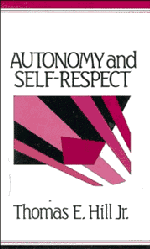Book contents
- Frontmatter
- Contents
- Sources and acknowledgments
- Introduction
- 1 Servility and self-respect
- 2 Self-respect reconsidered
- 3 Autonomy and benevolent lies
- 4 The importance of autonomy
- 5 Symbolic protest and calculated silence
- 6 Moral purity and the lesser evil
- 7 Self-regarding suicide: a modified Kantian view
- 8 Ideals of human excellence and preserving natural environments
- 9 Weakness of will and character
- 10 Promises to oneself
- 11 Social snobbery and human dignity
- 12 Pains and projects: justifying to oneself
- 13 The message of affirmative action
- Index
13 - The message of affirmative action
Published online by Cambridge University Press: 05 June 2012
- Frontmatter
- Contents
- Sources and acknowledgments
- Introduction
- 1 Servility and self-respect
- 2 Self-respect reconsidered
- 3 Autonomy and benevolent lies
- 4 The importance of autonomy
- 5 Symbolic protest and calculated silence
- 6 Moral purity and the lesser evil
- 7 Self-regarding suicide: a modified Kantian view
- 8 Ideals of human excellence and preserving natural environments
- 9 Weakness of will and character
- 10 Promises to oneself
- 11 Social snobbery and human dignity
- 12 Pains and projects: justifying to oneself
- 13 The message of affirmative action
- Index
Summary
Affirmative action programs remain controversial, I suspect, partly because the familiar arguments for and against them start from significantly different moral perspectives. Thus I want to step back for a while from the details of debate about particular programs and give attention to the moral viewpoints presupposed in different types of argument. My aim, more specifically, is to compare the “messages” expressed when affirmative action is defended from different moral perspectives. Exclusively forward-looking (e.g., utilitarian) arguments. I suggest, tend to express the wrong message, but this is also true of entirely backward looking (e.g., reparation-based) arguments. However, a moral outlook that focuses on crosstemporal narrative values, such as mutually respectful social relations, suggests a more appropriate account of what affirmative action should try to express. Assessment of the message, admittedly, is only one aspect of a complex issue, but a relatively neglected one. My discussion takes for granted some common sense ideas about the communicative function of action, and so I begin with these.
Actions, as the saying goes, often speak louder than words. There are times, too, when only actions can effectively communicate the message we want to convey and times when giving a message is a central part of the purpose of action. What our actions say to others depends largely, though not entirely, upon our avowed reasons for acting; and this is a matter for reflective decision, not something we discover later by looking back at what we did and its effects.
- Type
- Chapter
- Information
- Autonomy and Self-Respect , pp. 189 - 211Publisher: Cambridge University PressPrint publication year: 1991
- 4
- Cited by



